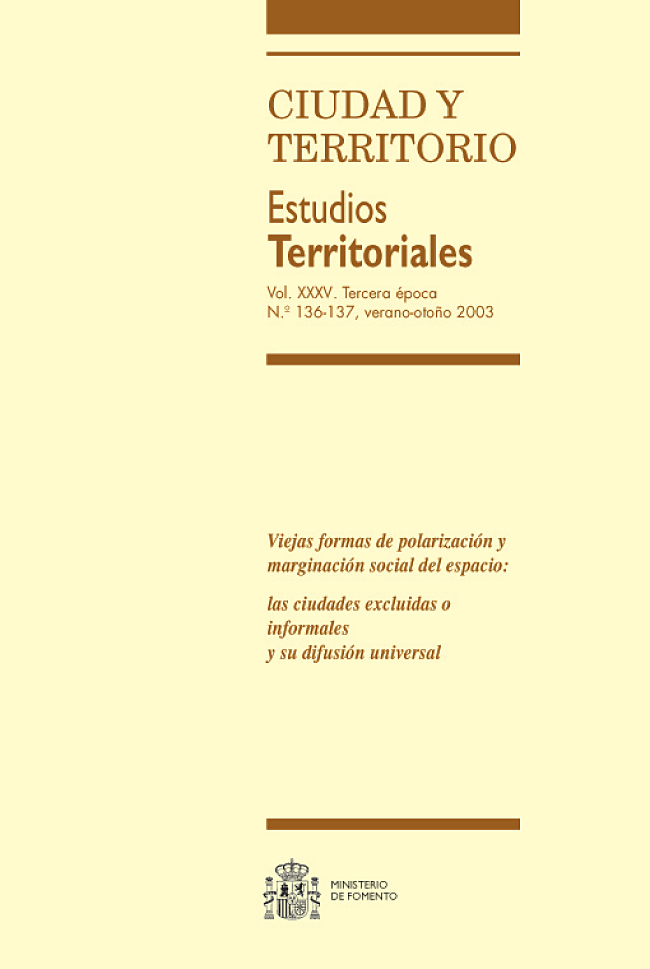The Impact on Territory of Social and Political Conflict: Segregation and the Ghettos of Caracas
Keywords:
Polarización social, historia urbana, conflictos sociales urbanos, sociología urbana, Caracas (Venezuela)Abstract
The article analyses the spatial impact and territorial effects of social and political conflict in the Venezuelan
capital, Caracas, a state of affairs exacerbated by an acute polarisation in both these aspects. Education to
forward civic responsibility is examined by means of concrete examples,as is the question as to whether or
not these initiatives be democratic or anti-democratic in their objectives. The study is held to reveal that both
aims are to be found and that they are much related to patterns of a highly segregated and exclusive use of
territory that is socially and politically conflictive, this use of territory turning upon a fictional definition of
the others who are the enemy and thus a need for unity born of fear of them. There is thus felt to be a
strangely two faced democratic practice by the citizens of the capital here which while expressing itself in
civic activity and social awareness in favour of the democratic process at the same time has another and far
from democratic aspect which expresses itself in a paramilitary banding together in defence of «the family
and private property» against outsiders. The paper finds that it is this anti-democratic face of things that
has led to the emergence of ghettos in Caracas founded upon acute social, political and ideological polarisation
and holds that this is a cancer upon the democratic body politic of the capital.
Downloads
Downloads
Published
How to Cite
Issue
Section
License
Copyright (c) 2003 María Pilar García-Guadilla

This work is licensed under a Creative Commons Attribution-NonCommercial-NoDerivatives 4.0 International License.
Considering the provisions of the current legislation on Intellectual Property, and in accordance with them, all authors publishing in CyTET give -in a non-exclusive way and without time limit- to the Ministry of Transport, Mobility and Urban Agenda the rights to disseminate, reproduce, communicate and distribute in any current or future format, on paper or electronic, the original or derived version of their work under a Creative Commons Attribution-NonCommercial-NoDerivative 4.0 license International (CC BY-NC-ND 4.0), as well as to include or assign to third parties the inclusion of its content in national and international indexes, repositories and databases, with reference and recognition in any case of its authorship.
In addition, when sending the work, the author(s) declares that it is an original work in which the sources that have been used are recognized, committing to respect the scientific evidence, to no longer modify the original data and to verify or refute its hypothesis. Author(s) also declare that the essential content of the work has not been previously published nor will it be published in any other publication while it is under evaluation by CyTET; and that it has not been simultaneously sent to another journal.
Authors must sign a Transfer of Rights Form, which will be sent to them from the CyTET Secretariat once the article is accepted for publication.
With the aim of promoting the dissemination of knowledge, CyTET joins the Open Journal Access (OA) movement and delivers all of its content to various national and international indexes, repositories and databases under this protocol; therefore, the submission of a work to be published in the journal presupposes the explicit acceptance by the author of this distribution method.
Authors are encouraged to reproduce and host their work published in CyTET in institutional repositories, web pages, etc. with the intention of contributing to the improvement of the transfer of knowledge and the citation of said works.








 Enlace a CyTET en Linkedin
Enlace a CyTET en Linkedin